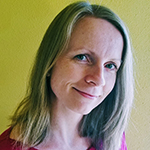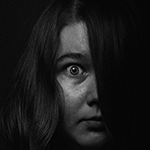peeling off
the hairless skin that isolates me from the world
is a few millimeters thick
(thicker on finger tips
thinner in elbow pits)
the only contact with the world I have is
through membranes of mucous (glass, opal)
through here you can come in
lay eggs
come out
a fruit fly is isolated from the universe
by a golden exoskeleton
complete with a pair of wings (opal, glass)
the fruit fly hit the space
pierced right through it
the fruit fly can roll its eyes inward
to see its own chromosome
I am in contact with the universe
through the red eyes of a fruit fly
Tumulus the mole builds a house underneath the cemetery in the town of Szklary Gorne
moving through the water with the shovels of his paws,
sliding through claylike layers with his missile-slender body,
patiently pushing soil out of the soil.
work results are beautiful and good: a moss-carpeted bedroom,
a pantry full of earthworms with slashed nerves.
time to dig a well, says Tumulus
and he drills down, more swiftly than a gannet, his rough fingers seeking humidity.
but instead he senses emptiness. a feeling alien to moles.
cold, bitterness, failure fill his nostrils. a hum,
impossible to mute, arises in his head.
carefully, he enters the musty coffin, crawls,
curls up into a ball under the ribbed vault.
crossing over
philosophy is a ponderous column polished over thousands of years
which always lacked a capital but soon
it shall be capped by
Laika, a soviet scientist and astronaut, the pride of the nation.
she has just reached Earth orbit (perigee of 211 km,
apogee of 1659 km) on board Sputnik 2. soon
she will share her reflections and the microphones fitted to the capsule
will capture every word she says.
first lap
cosmos abandoned basement
tastes of iron rod
second lap
stars rocks hurt my paws
can’t hear any others
third lap
home a hard capsule
cosmos streets of Moscow
fourth lap
my name is Kudryavka
I’m a soup made of dog
recitativo of a tapeworm stuck to Maria Callas’s intestine
for O.F
I can hear her sing
this is my body which I love and I don’t which I love and I don’t which I
hate
I soak up the bitter night mantra
rough Greek words cut glass pane
I grow
when you’re up on stage
it’s not you they applaud
oh Violetta, Tosca, Norma, Aida
but the ribbon in your guts that
squeezes your waist from the inside
I made you into a slender fruit
from the tree of the knowledge of bel canto and brutta vita
beware
my children are thriving in your flesh
systems. dissociation
the most beautiful organ is the brain
enveloped with meninges, covered with the cranium can,
fitting in its tracts stability, drive,
and identity, which you must rip off like a used
band-aid, uncover the wounds for the salt to corrode.
you’re all salt, my love, and you must
fall apart; out of your body Europe will
precipitate a golden residue, where
lead, silver, consciousness dance together
Ksenia Bolotnikova recalls Holodomor
in nineteen thirty-two, sir, there was nothing left.
no crop, no potatoes, no farm or domestic animals,
no wool, no sickles, no flails, no passports, no wagons,
no roads, no stars—we ate everything but the knife.
the spring was cold, windy and rainy. one day,
from the water collected in the hollow of my cheek a devil emerged
assuring me that once I eat my daughter,
I will throw up everything:
the crop, the potatoes, the animals, the wool, the sickles, the flails,
the passports, the wagons, the roads, the stars—
I will turn the whole world inside out like a pillowcase
and the famine will be over.
my daughter will come back, too, safe and sound, so no loss there.
the knife was left uneaten in fear that its blade would reveal
the shame hidden in-between the folds.
the hand, unstopped by the angel
(if an angel came down, sir, from the heavenly sky to Sofievka
we would’ve eaten him inevitably, not even caring for
plucking his wings), a hand, twenty-seven
tiny fragile bones shining through the skin like a firefly,
the hand slit the throat.
go ahead and tell them, please,
to give me some bishop’s wort rootstalk.
for all these years I have been trying to throw up,
save Ukraine
Translator’s note:
The poems by Anna Adamowicz talk about the kingdom of Animalia but, surprisingly, it is not the human species that constitutes the main focus of her work. Although she does describe in detail a series of biological systems found in the human body, she dedicates a lot of attention to the world of insects, arthropods, reptiles, worms and, finally, mammals, where we can observe things from their perspective. In the background there is Europe, sometimes as a place or an organism.
Apart from allowing us to witness the world from such a distinct position, Adamowicz’s poems play another important role: they give voice to the voiceless. In this way, we are able to observe Tumulus the mole building a house or accompany Laika the dog in her short and tragic journey into space.
Moreover, Adamowicz also gives voice to those who never had a chance to speak up. One of her poems talks about Ksenia Bolotnikova, a young Ukrainian woman who lived during the man-made famine in Soviet Ukraine in the 1930s and who murdered her own daughter with the intention to feed her son and herself. Ksenia’s powerful confession enwrapped in Adamowicz’s poem is an attempt to describe the horrors of starvation without any traces of judgement because—who would dare to do that?
The biological aspect of Adamowicz’s texts was a meaningful lesson in how to translate a poem without making it sound like an encyclopedia entry. While the author incorporates biology into verse in the most harmonious way possible, as a translator, I often found it challenging to recreate the novelty of her perception as well as her carefully crafted poetic language.
Another difficulty I encountered is related to the choice of poems to submit. Adamowicz covers a wide array of themes in her volume by touching upon biological, environmental, historical, social, and cultural aspects of the world. On the one hand, I wanted to give the reader a sample of each of these factors; on the other hand, I could not help but translate the poems which affected me personally, hoping that they will likewise appeal to the reader.

Aga Gabor da Silva graduated from the University of Massachusetts, Amherst, where she studied Lusophone Literatures and Cultures. Aga also holds a Master of Arts in English from Adam Mickiewicz University in Poznań, Poland. Her first translation from Polish into English—two poems “Tights” and “Buttons” written by Bronka Nowicka—was published in the Winter/Spring 2019 issue of Lunch Ticket. Aga currently lives in sunny New Mexico with her family. When she’s not busy chasing after her three-year old, she translates literature.

Anna Adamowicz was born in 1993 in Lubin, in south-western Poland. She is a poet and a laboratory diagnostician. Her first volume of poetry, Wątpia (Doubt), published in 2016 by Kwadratura, was nominated for the Gdynia Literary Award and won third place in the “Browar za debiut” (Beer for Debut) poll. Her second collection of poetry, Animalia, was published in January of 2019 by Biuro Literackie, and a few poems from the volume have been translated into Hungarian, Slovenian, and English. You can follow Anna Adamowicz on Facebook.

 BACK TO ISSUE
BACK TO ISSUE